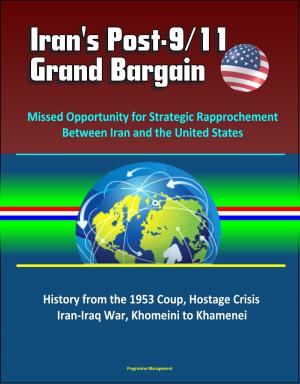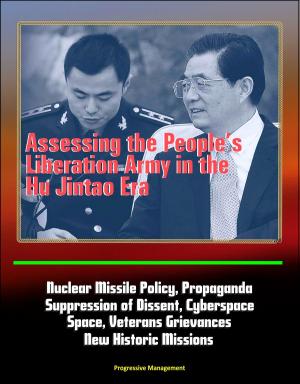Marshall Center Reports: North Korea and Iran's Nuclear Programs as Instability Factors, How Iran Would Apply its Asymmetric Naval Warfare Doctrine in a Future Conflict - Hormuz Chokepoint
Nonfiction, History, Asian, Asia, Military, Other| Author: | Progressive Management | ISBN: | 9781311610492 |
| Publisher: | Progressive Management | Publication: | March 27, 2014 |
| Imprint: | Smashwords Edition | Language: | English |
| Author: | Progressive Management |
| ISBN: | 9781311610492 |
| Publisher: | Progressive Management |
| Publication: | March 27, 2014 |
| Imprint: | Smashwords Edition |
| Language: | English |
Two informative papers from the Marshall European Center for Security Studies analyze the threats posed by Iran and North Korea. The first paper, North Korea and Iran's Nuclear Programs as Instability Factors in the New System of International Relations, takes a critical look at the most challenging proliferation issues of our time. This detailed and carefully documented study goes well beyond the current rhetoric of politics and looks closely at historical developments, geopolitical factors, the scientific parameters of such development, and the potential consequences of the acquisition of weapons in these two countries. Of critical importance for the present and the future is the role of international organizations from the UN Security Council to the International Atomic Energy Agency in addressing these concerns on behalf of the international community. While the two independent cases of proliferation challenge examined are still unresolved, this paper clearly lays out the risks for the two organizations in facing future challenges, based on the eventual outcome of the two cases examined here. Also examined are the security implications of the emergence of North Korea and Iran as nuclear weapons states for neighbors, such as China and the EU, and of particular importance for Russia and the United States, as the leading nuclear powers. For all states, it attempts to resolve the proliferation challenges from Iran and North Korea and examines the reasons that the desired results have not yet been achieved. This careful study and analysis places proliferation in its new and proper context for a world that is no longer bipolar, where competing ideologies divided the globe into two camps and where the balance of power between these two global camps defined the understanding of security and stability for all others. In the new world security context even broadly shared goals may not be supported with broadly held strategies on how to achieve those goals.
The second paper, Obsolete Weapons, Unconventional Tactics, and Martyrdom Zeal - How Iran Would Apply its Asymmetric Naval Warfare Doctrine in a Future Conflict, This research paper addresses different (e.g. historical, ideological, operational, tactical, technical) aspects related to the unique asymmetric naval warfare doctrine of the Islamic Republic of Iran (IRI) and its naval forces. It is based on the assumption that the ruling IRI regime is, so far, undeterred and fully determined to achieve its final goal to get weapons of mass destruction, thus setting the precondition for further dangerous developments which may eventually lead toward direct confrontation with the USA, and perhaps some other state. Research argues that in any kind of a military-type scenario, the naval power of the IRI would play a crucial role in the overall asymmetric response by the Iranians. To support this thesis, the research, particularly reviews and analyzes:
The essence of, and philosophy behind, the Iranian asymmetric warfare strategy (including its part relevant to naval domain), its historical roots and evolution (how the Islamic Revolution, Iran-Iraq war and other events have influenced the strategic visions and operational concepts).
The issue of a martyrdom culture, preached by the IRI regime, and its possible role as force multiplier in asymmetric warfare.
Specificity of the dual-way [conventional and unconventional capabilities] military organization of the IRI, with emphasis on the unconventional, semi-terrorist nature of the Islamic Revolutionary Guards Corps.
Two informative papers from the Marshall European Center for Security Studies analyze the threats posed by Iran and North Korea. The first paper, North Korea and Iran's Nuclear Programs as Instability Factors in the New System of International Relations, takes a critical look at the most challenging proliferation issues of our time. This detailed and carefully documented study goes well beyond the current rhetoric of politics and looks closely at historical developments, geopolitical factors, the scientific parameters of such development, and the potential consequences of the acquisition of weapons in these two countries. Of critical importance for the present and the future is the role of international organizations from the UN Security Council to the International Atomic Energy Agency in addressing these concerns on behalf of the international community. While the two independent cases of proliferation challenge examined are still unresolved, this paper clearly lays out the risks for the two organizations in facing future challenges, based on the eventual outcome of the two cases examined here. Also examined are the security implications of the emergence of North Korea and Iran as nuclear weapons states for neighbors, such as China and the EU, and of particular importance for Russia and the United States, as the leading nuclear powers. For all states, it attempts to resolve the proliferation challenges from Iran and North Korea and examines the reasons that the desired results have not yet been achieved. This careful study and analysis places proliferation in its new and proper context for a world that is no longer bipolar, where competing ideologies divided the globe into two camps and where the balance of power between these two global camps defined the understanding of security and stability for all others. In the new world security context even broadly shared goals may not be supported with broadly held strategies on how to achieve those goals.
The second paper, Obsolete Weapons, Unconventional Tactics, and Martyrdom Zeal - How Iran Would Apply its Asymmetric Naval Warfare Doctrine in a Future Conflict, This research paper addresses different (e.g. historical, ideological, operational, tactical, technical) aspects related to the unique asymmetric naval warfare doctrine of the Islamic Republic of Iran (IRI) and its naval forces. It is based on the assumption that the ruling IRI regime is, so far, undeterred and fully determined to achieve its final goal to get weapons of mass destruction, thus setting the precondition for further dangerous developments which may eventually lead toward direct confrontation with the USA, and perhaps some other state. Research argues that in any kind of a military-type scenario, the naval power of the IRI would play a crucial role in the overall asymmetric response by the Iranians. To support this thesis, the research, particularly reviews and analyzes:
The essence of, and philosophy behind, the Iranian asymmetric warfare strategy (including its part relevant to naval domain), its historical roots and evolution (how the Islamic Revolution, Iran-Iraq war and other events have influenced the strategic visions and operational concepts).
The issue of a martyrdom culture, preached by the IRI regime, and its possible role as force multiplier in asymmetric warfare.
Specificity of the dual-way [conventional and unconventional capabilities] military organization of the IRI, with emphasis on the unconventional, semi-terrorist nature of the Islamic Revolutionary Guards Corps.















